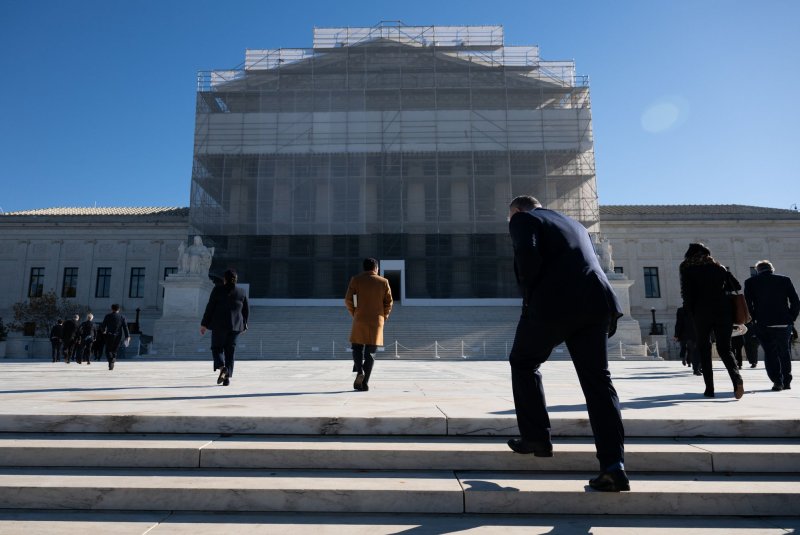Top Stories
Supreme Court Weighs In on Inmate’s Religious Rights Case

UPDATE: The Supreme Court is currently deliberating a pivotal case that could redefine the religious rights of inmates across the nation. Justices expressed skepticism today, November 10, 2023, regarding whether prisoners can sue government officials for personal damages related to their religious freedoms.
The case centers on Damon Landor, a devout Rastafarian who has vowed never to cut his hair as part of his faith. While serving a five-month sentence in a Louisiana prison for a drug charge, Landor claims that guards forcibly shaved his hair against his will, violating his religious beliefs. During the oral arguments, Landor’s legal team argued that the Religious Land Use and Institutionalized Persons Act (RLUIPA) protects him, and he contends that the guards ignored a prior appeals court ruling that recognized his right to keep his dreadlocks.
The situation escalated when Landor handed the guards documentation of his rights, only for them to discard it and proceed with the haircut. This incident highlights a disturbing trend of potential abuse of power within the prison system.
Justice Amy Coney Barrett characterized the facts of Landor’s case as “egregious” but raised questions about the legal precedent allowing inmates to hold individual prison officials accountable under RLUIPA. She noted that previous rulings have consistently affirmed that the act does not authorize damage claims against those not receiving federal funds. Louisiana officials echoed this stance, arguing that only the state can be liable under the act.
Landor’s attorney, Zachary Tripp, countered this argument, asserting that the law should indeed allow for individual lawsuits, given its clear intent to protect prisoners’ rights. “Without the ability to seek damages, officials might treat the law with disdain,” he stated forcefully.
The court’s conservative justices appeared unconvinced, with Justice Brett Kavanaugh stating the need for a “clear statement” within the law to authorize such suits. In contrast, the liberal justices, including Sonia Sotomayor, probed deeply into the implications of the case. Sotomayor questioned whether a warden cutting a prisoner’s hair could be unaware of the legal ramifications, suggesting a potential for accountability.
The implications of this case extend beyond Landor’s individual plight. The National Sheriffs’ Association has voiced concern that a ruling favoring Landor could unleash a wave of lawsuits, straining the already burdened prison and court systems. Sheriff Greg Champagne emphasized the potential for “excessive lawsuits” that could overwhelm government resources.
Academics are also weighing in. Charles Price, a professor at the University of North Carolina, highlighted that many prison staff lack awareness of inmates’ religious practices. He believes that allowing inmates to sue for damages could act as a deterrent against rights violations, enhancing protections for vulnerable individuals behind bars.
The Supreme Court is set to deliver its decision by summer 2024, and its ruling could have far-reaching consequences for religious liberty and the treatment of inmates across the United States. As the situation develops, it remains crucial for all eyes to stay on this landmark case, which may redefine the boundaries of religious freedom within the prison system.
Stay tuned for more updates on this urgent legal battle.
-

 Top Stories2 weeks ago
Top Stories2 weeks agoMarc Buoniconti’s Legacy: 40 Years Later, Lives Transformed
-

 Health3 weeks ago
Health3 weeks agoInnovative Surgery Restores Confidence for Breast Cancer Patients
-

 Sports4 weeks ago
Sports4 weeks agoSteve Kerr Supports Jonathan Kuminga After Ejection in Preseason Game
-

 Science4 weeks ago
Science4 weeks agoChicago’s Viral ‘Rat Hole’ Likely Created by Squirrel, Study Reveals
-

 Entertainment4 weeks ago
Entertainment4 weeks agoZoe Saldana Advocates for James Cameron’s Avatar Documentary
-

 Top Stories2 weeks ago
Top Stories2 weeks agoBOYNEXTDOOR’s Jaehyun Faces Backlash Amid BTS-TWICE Controversy
-

 Politics4 weeks ago
Politics4 weeks agoDallin H. Oaks Assumes Leadership of Latter-day Saints Church
-

 Lifestyle4 weeks ago
Lifestyle4 weeks agoKelsea Ballerini Launches ‘Burn the Baggage’ Candle with Ranger Station
-

 Business4 weeks ago
Business4 weeks agoTyler Technologies Set to Reveal Q3 2025 Earnings on October 22
-

 Health4 weeks ago
Health4 weeks agoCommunity Unites for Seventh Annual Mental Health Awareness Walk
-

 Business3 weeks ago
Business3 weeks agoZacks Research Downgrades Equinox Gold to Strong Sell Rating
-

 Health3 weeks ago
Health3 weeks ago13-Year-Old Hospitalized After Swallowing 100 Magnets









